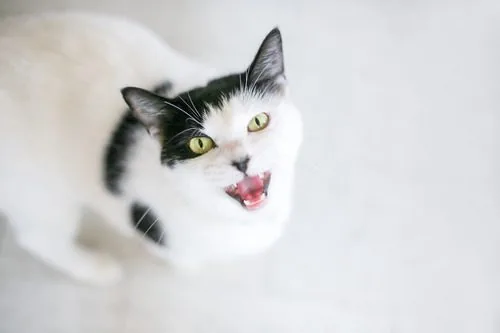Why is My Cat Meowing so Much?

Cats use vocalizations to communicate with their humans, but excessive meowing can sometimes leave pet owners feeling puzzled or even concerned. If you’ve been wondering, “Why is my cat meowing so much?”, you’re not alone. Cats meow for a variety of reasons, ranging from simple requests for attention to potential medical concerns. At West Loop Veterinary Care, our team is here to help you understand the cause behind your cat’s vocalizations to help strengthen your bond with them and ensure their needs are met. Let’s explore some of the most common reasons cats meow excessively and what you can do about it.
Seeking Attention and Affection
One of the most common reasons a cat meows frequently is simply because they want your attention. Cats are social creatures, and many enjoy interacting with their humans. If your cat meows every time you walk into the room or when you’re busy with something else, they might just be asking for some love.
Signs Your Cat Wants Attention
- Rubbing against your legs while meowing
- Following you around the house
- Purring loudly once they get your attention
- Jumping onto your lap or workspace
If your cat’s vocalizations are attention-seeking, try setting aside dedicated time each day for petting and play sessions. Engaging with your cat can help reduce excessive meowing while also strengthening your bond.
Hunger or a Desire for Food
Cats often associate meowing with mealtimes. If your cat meows persistently in the kitchen or around their food bowl, they might be telling you they’re hungry—even if it’s not time for their next meal.
Managing Food-Related Meowing
- Stick to a consistent feeding schedule
- Avoid giving in to every meow with extra treats
- Ensure your cat is receiving a balanced diet
- Consider using an automatic feeder to provide meals at set times
If your cat suddenly starts meowing excessively for food despite regular feeding, it may be worth discussing their diet and nutrition with your veterinarian.
Stress or Anxiety
A sudden increase in meowing can sometimes indicate that your cat is feeling stressed or anxious. Cats are creatures of habit, and changes in their environment can cause distress, leading to more vocalization.
Common Stress Triggers
- Moving to a new home
- Introduction of a new pet or family member
- Loud noises or frequent visitors
- Changes in routine
To help your cat feel more comfortable, try providing them with a quiet, secure space where they can retreat when they feel overwhelmed. Calming pheromone diffusers or enrichment activities like interactive toys may also help ease their stress.
Medical Issues or Pain
Sometimes, excessive meowing can be a sign of an underlying health issue. If your cat’s vocalizations seem unusual, urgent, or paired with changes in appetite, behavior, or litter box habits, it’s important to seek veterinary care.
Health Conditions That Can Cause Increased Meowing
- Hyperthyroidism
- Kidney disease
- Cognitive dysfunction (common in older cats)
- Urinary tract infections
- Hypertension (high blood pressure)
If your cat’s meowing is accompanied by other symptoms like weight loss, excessive thirst, or lethargy, don’t ignore it. Call one of our locations or book an appointment online today to have your cat examined by one of our veterinarians.
Aging and Cognitive Changes
Senior cats often experience cognitive changes that can lead to confusion and increased vocalization. If your older cat is meowing excessively, especially at night, they may be experiencing cognitive dysfunction syndrome (CDS), similar to dementia in humans.
Helping an Aging Cat with Excessive Meowing
- Keep a nightlight on to help them navigate in the dark
- Stick to a predictable daily routine
- Provide comfortable resting spots in familiar locations
- Talk to your veterinarian about possible treatment options
Age-related meowing can sometimes be managed with simple environmental adjustments, but professional guidance can help ensure your cat remains comfortable in their golden years.
Cats Meow to Communicate With Their Owners
Your cat’s meowing is their way of talking to you, and understanding the reasons behind their vocalizations can help you meet their needs effectively. Whether they’re asking for attention, expressing hunger, or signaling a health concern, paying attention to their behavior is key. If your cat’s meowing seems excessive or out of the ordinary, don’t hesitate to reach out for professional advice. Call one of our locations or book an appointment online today to discuss your cat’s vocal habits with your veterinarian at West Loop Veterinary Care.
West Loop:
(312) 421-2275
Streeterville:
(312) 766-5959
